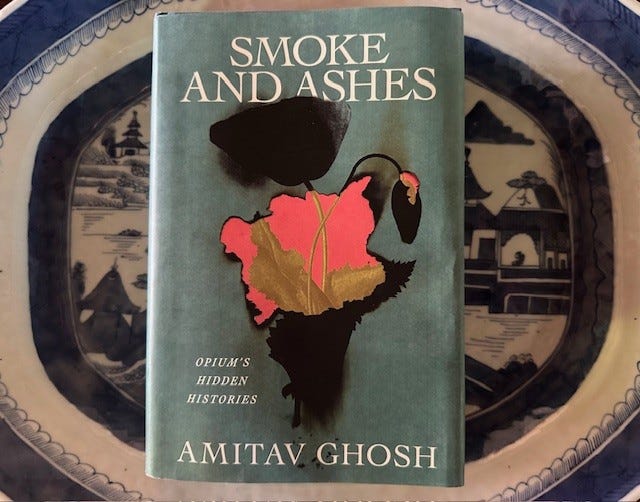Review of SMOKE AND ASHES
The story of the 19th century Opium trade ... history certainly does rhyme
After reading the new book by Amitav Ghosh, Smoke and Ashes: Opium’s Hidden Histories, I realized that I have finally accepted the curtain being pulled, OZ being revealed for what it is. Ghosh is a writer for all seasons. He is a friend and one of the most interesting people I know. His historical fiction Ibis trilogy ranks in many minds with Hilary Mantel’s extraordinary Thomas Cromwell trilogy. Ibis is a monument to trailblazing levels of research into the dark history of the opium trade, the sinister roles played by Western powers, its devastating effects on India and China and its metaphorical place in our increasing awareness of the predatory destructiveness of our colonial pasts and our capitalist present. This was not the history I grew up with. Amitav’s expose of the opium’s role in the literal and figurative fortunes of the Western colonial powers – particularly those of Britain (of course) and America (a rude surprise) – will shift how you think. The fact that the Dutch (trail breaking ruthless SOBs as always), the British and later the Americans (all from the best families) spent 100 years designing the first and likely, in today’s dollars, the most profitable drug cartel in human history is not only all too sadly new news, it also gives brutal context to the horrors we accept today – over half a million Americans killed in an opioid crisis accelerated by a family that got barely slapped in the hand by bought and sold courts and politicians. Combine this with the 2008 collapse that left millions bankrupt and not one banker in jail and you wonder why a nasty piece of revenge theater like Donald Trump might be elected President of the “last great hope” on this earth?
The dramaturgy of the last few sentences is a direct result of having to face a reality that Western colonialism in ALL its forms was corrupt and dehumanizing. That my beloved London was built on the “smoke and ashes” of millions of colonial subjects and their vanquished lives. That my uneasy but proud embrace of the WASP world of my past is an embrace of, more than anything else, ill-gotten gains and brutal exclusion. That Winston Churchill may have saved the Western world (no small thing) but his legacy is forever poisoned by self-aggrandizement and mythmaking. That my Eurocentric bias is just that and so much more. Not that the rest of history and the world has offered up many more enlightened alternatives to the various political, economic, and social models of governance embraced by the West over the past 500 years. The truth may still be that the Western versions of governance, conquest and control might be as good as it gets. Certainly, it seems that may be part of the drama we are now experiencing. All that historical meta-angst aside, this book is a big DNKT.
What, you may ask, is DNKT? It is my own marginalia that stands for Did Not Know This. It exists in most of the non-fiction books I have read in the past ten years. It does not suggest that if DNKT is NOT there that I already knew it … whatever it is. Rather, it is some version of a fact or part of an event or a facet of a person that I am very happy to have discovered. The more a book is littered with the acronym, the more likely the book is changing how I think. Smoke and Ashes was just such a book. The fact that the opium trade in Canton was a commercial training ground for sons of prominent Boston families (an HBS for “Brahmins”) was a DNKT as was the knowledge that the Cantonese China in our dining room very likely originated in one way or another from the trade. Many of the great East Coast museums were endowed by China trade opium riches. There was nothing original in the Sackler’s philanthropic playbook. The maxim that ‘behind every fortune there is a great crime’ seems more and more accurate. I believe that the search for a DNKT is a huge part of the holy grail of reading non-fiction. Smoke and Ashes provides this elusive and enrichening experience as well as any book I have recently read.
Smoke and Ashes
Amitav Ghosh
2024 416 pages (including Notes
)


